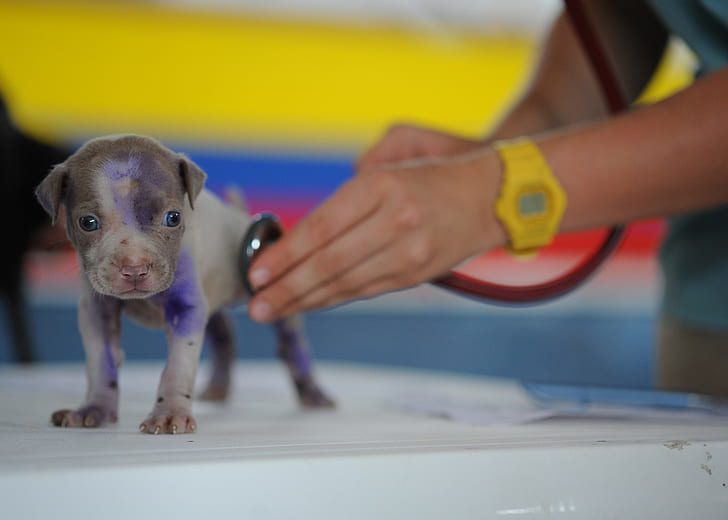Having a new puppy is exciting, but dealing with digestive issues can be a challenge. From vomiting to diarrhea, puppies can experience a range of stomach problems that affect their health and happiness.
In this article, we will provide helpful tips and tricks to manage your pup’s digestive issues and ensure they stay healthy and well-fed.
Follow our advice to alleviate your puppy’s tummy troubles and make them feel comfortable and content.
1. Consult with a veterinarian

It’s essential to stress the importance of consulting with a professional when it comes to addressing your puppy’s digestive issues.
While there are many remedies and tips available online, every pup is unique and requires a tailored approach to its care.
A veterinarian can identify underlying health issues that may be causing digestive problems and prescribe medication or a specialized diet to provide relief.
Furthermore, digestive issues can quickly escalate into more severe and life-threatening illnesses if left untreated. Puppies are particularly susceptible to dehydration, which can occur quickly when experiencing diarrhea or vomiting.
A veterinarian can monitor a pup’s hydration levels and intervene if necessary, preventing more severe complications.
Consulting with a veterinarian also helps ensure that any remedies or medication administered are safe and effective. Unsupervised use of over-the-counter medicines can be harmful and even fatal to a puppy if not used correctly.
9 Tips For Helping Puppies With Digestive Issues
2. Identify the cause

It’s crucial to identify the underlying cause of your pup’s digestive issue to address it effectively. As a responsible pet owner, you should observe their behavior and note any changes, such as vomiting, diarrhea, or loss of appetite.
While it can be challenging to pinpoint the cause accurately, some common triggers include:
- Sudden changes in diet or food type
- Consuming spoiled or contaminated food
- Allergic reactions to food or environmental factors
- Parasites or bacteria infection
Identifying the root of the problem helps you tailor a treatment plan and avoid future occurrences. For instance, if you suspect a food allergy, you can adjust their diet accordingly and monitor their response. On the other hand, if parasites are the primary cause, medication can target and eradicate them.
Additionally, identifying the cause prevents further irritation to your pup’s digestive system. If left untreated, the issue can worsen, leaving your pup dehydrated, weak, and ill-tempered.
3. Adjust the diet
As a pet owner, it’s essential to be mindful of your pup’s diet, especially if they have digestive issues. Adjusting their diet can relieve symptoms, alleviate discomfort, and prevent further complications.
A fowl or heavy diet can irritate your pup’s digestive system, leading to vomiting and diarrhea. Exploring alternatives, such as boiled chicken and rice or prescription diets, can be effective solutions. Additionally, some pups may require specific diets such as low-fat or easily digestible formulas.
It’s vital to gradually introduce any new foods to your pup’s diet to prevent further irritation. Frequent and smaller meals can assist digestion and prevent overeating, which can lead to vomiting and bloating. Adequate hydration is also vital in keeping your pup’s hydration levels in check.
Supplements such as digestive enzymes or probiotics may support your pup’s digestive system. While these supplements are typically safe, consult with a veterinarian first before introducing any new supplements.
9 Tips For Helping Puppies With Digestive Issues
4. Offer smaller, more frequent meals
Offering smaller and more frequent meals can assist with your pup’s digestion and relieve discomfort. It’s essential to avoid overfeeding your pup to avoid gastrointestinal distress, which can lead to vomiting and diarrhea.
The frequency and amount of feeding required depend on your pup’s age, size, and breed. Typically, puppies may require more frequent meals, while adult pups may require 2-3 meals per day.
A general rule of thumb is to feed your pup about 3-4 small meals throughout the day.
Additionally, feeding your pup in a calm environment can reduce their levels of stress, contributing to better digestion. Consider feeding your pup in a quiet room away from noises or distractions.
It’s essential to avoid feeding your pup right before or after intense exercise. This timeframe increases the chances of bloating and can place pressure on the digestive system.
9 Tips For Helping Puppies With Digestive Issues
5. Monitor water intake
Digestive issues may cause your pup to experience dehydration, which can lead to more severe complications. As a responsible pet owner, it’s essential to keep a close eye on your pup’s water intake to ensure they stay hydrated.
Provide fresh and clean drinking water for your pup at all times. Consider using a water fountain, as moving water may encourage your pup to drink more. Keep water bowls clean to prevent contamination, and refill them as necessary.
It’s essential to monitor your pup’s water consumption. If you notice a sudden reduction in water intake, it’s vital to address the cause immediately. A decrease in water consumption may be due to discomfort, stress, or illness.
On the other hand, excessive water intake may be a symptom of an underlying condition. In such instances, it’s vital to consult with a veterinarian to identify the cause and prevent further complications.
6. Introduce probiotics
Probiotics are microorganisms that can offer various health benefits and can promote a healthy digestive system. Studies have shown that introducing probiotics can assist in regulating your pup’s digestive system by promoting the growth of healthy bacteria.
Probiotic supplements come in various forms such as powder, liquid, or capsules. Integrating them into your pup’s dietary regimen can improve symptoms such as diarrhea and vomiting. Probiotics can also enhance nutrient absorption and boost the immune system.
It’s crucial to consult with a veterinarian before introducing any new supplements to your pup’s diet. Veterinarians can advise on the best probiotic supplements and recommended dosage.
Additionally, probiotics should not be viewed as a cure-all treatment for digestive issues. They may work well in combination with other measures such as adjusting the diet and smaller more frequent meals.
See also: The Benefits of Prebiotics and Probiotics For Puppies
7. Avoid table scraps
Giving your pup table scraps may seem like a harmless gesture of affection, but it can cause significant digestive issues.
Table scraps can be high in fat, salt, and spices, all of which can disrupt your pup’s digestive system and cause discomfort and complications.
Feeding your pup table scraps can also lead to an imbalance in their nutritional intake, leading to an increased risk of obesity, heart disease, and other health issues.
It’s essential to stick to your pup’s dietary regimen and avoid feeding them human food.
If you’d like to give your pup a treat, there are many commercially available treats that are specially formulated for pups and are healthy and safe.
8. Add fiber to the diet
Fiber is an essential component in supporting your pup’s digestive system. It promotes healthy bowel movements and can prevent constipation. Incorporating fiber into your pup’s diet can alleviate symptoms such as diarrhea and vomiting.
There are many sources of fiber that you can include in your pup’s diet, such as pumpkin, sweet potato, green beans, and apples. These high-fiber foods have other added benefits such as providing vitamins, minerals, and antioxidants.
It’s essential to introduce these foods to your pup’s diet gradually to avoid gastrointestinal distress. Start by adding small portions and monitor their response before adjusting their ratio.
Notably, fiber alone may not address the underlying cause of digestive issues. It’s essential to work with a veterinarian to identify the cause and develop an appropriate treatment plan that could include adding fiber to your pup’s diet.
9. Limit stress
Stressful situations can cause digestive issues in your pup and can worsen existing conditions. As a responsible pet owner, it’s crucial to limit your pup’s stress levels to prevent digestive issues and maintain overall health.
Common sources of stress for pups include changes in the environment, loud noises, separation anxiety, and unfamiliar people or animals. It’s essential to create a comfortable and secure living environment for your pup to reduce their stress levels.
Scheduling regular exercise and playtime with your pup is a great way to reduce their stress levels. Adequate exercise promotes healthy bowel movements, thereby preventing constipation and other related issues.
Additionally, creating a calm and quiet environment during mealtime by removing distractions such as loud music or the presence of unfamiliar people can decrease your pup’s stress levels and aid in digestion.
In Conclusion
Having a puppy with digestive issues can undoubtedly be a challenging experience, but with the tips discussed in this article, you can help relieve their discomfort and promote overall health.
Remember to consult with a veterinarian when dealing with digestive issues to ensure that your pup receives the best possible care.
Identifying the underlying cause of digestive issues is crucial to effective treatment. Adjusting your pup’s diet, offering smaller and more frequent meals, and including fiber can all support their digestive system.
Additionally, monitoring water intake, introducing probiotics, limiting stress, and avoiding table scraps can assist in eliminating digestive issues and maintaining your pup’s overall health.





Leave a Reply